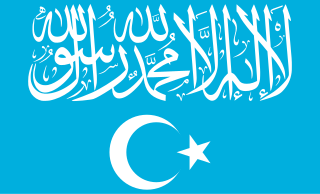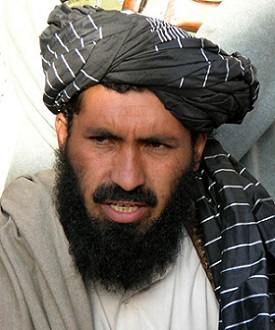Related Research Articles

Al-Qaeda is a pan-Islamist militant organization led by Sunni Jihadists who self-identify as a vanguard spearheading a global Islamist revolution to unite the Muslim world under a supra-national Islamic caliphate. Its membership is mostly composed of Arabs, but also includes people from other ethnic groups. Al-Qaeda has mounted attacks on civilian, economic and military targets of the US and its allies; such as the 1998 US embassy bombings, the USS Cole bombing and the September 11 attacks. The organization is designated as a terrorist group by NATO, the UN Security Council, the European Union, and various countries around the world.

The Turkistan Islamic Party (TIP) is a Uyghur Islamic extremist organization founded in Pakistan by Hasan Mahsum. Its stated goals are to establish an Islamic state in Xinjiang and Central Asia.

Ayman Mohammed Rabie al-Zawahiri was an Egyptian-born pan-Islamist militant and physician who served as the second general emir of al-Qaeda from June 2011 until his death in July 2022. He is best known for being one of the main orchestrators of the September 11 attacks.

The Islamic Movement of Uzbekistan was a militant Islamist group formed in 1998 by Islamic ideologue Tahir Yuldashev and former Soviet paratrooper Juma Namangani; both ethnic Uzbeks from the Fergana Valley. Its original objective was to overthrow President Islam Karimov of Uzbekistan and create an Islamic state under Sharia; however, in subsequent years, it reinvented itself as an ally of Al-Qaeda. The group also maintained relations with Afghan Taliban in 1990s. However, later on, relations between the Afghan Taliban and the IMU started declining.
Tohir Yo'ldosh (Yunusov Umid), born Tohir Abdulhalilovich Yuldashev (‹See Tfd›Russian: Тахир Абдулхалилович Юлдашев (Yunusov Umid)), (2 October 1967 – 1 October 2009) was an Uzbek Islamist militant who cofounded the Islamic Movement of Uzbekistan (IMU), an Islamist organization active in Central Asia, with Juma Namangani in August 1998. According to the Defense Intelligence Agency he was a key leader opposing US forces during Operation Anaconda. The United Nations considers the IMU an Islamic terrorist organization.

The 1996–2001 Afghan Civil War, also known as the Third Afghan Civil War, took place between the Taliban's conquest of Kabul and their establishing of the Islamic Emirate of Afghanistan on 27 September 1996, and the US and UK invasion of Afghanistan on 7 October 2001: a period that was part of the Afghan Civil War that had started in 1989, and also part of the war in Afghanistan that had started in 1978.

The Islamic Jihad Union is a militant Islamist organization founded in 2002 as a splinter group of the Islamic Movement of Uzbekistan (IMU). Headquartered in North Waziristan, a mountainous region of northwest Pakistan, bordering Afghanistan, the group has been affiliated with both Al-Qaeda and the Taliban.

The insurgency in Khyber Pakhtunkhwa, also known as the War in North-West Pakistan or Pakistan's war on terror, is an ongoing armed conflict involving Pakistan and Islamist militant groups such as the Tehrik-i-Taliban Pakistan (TTP), Jundallah, Lashkar-e-Islam (LeI), TNSM, al-Qaeda, and their Central Asian allies such as the ISIL–Khorasan (ISIL), Islamic Movement of Uzbekistan, East Turkistan Movement, Emirate of Caucasus, and elements of organized crime. Formerly a war, it is now a low-level insurgency as of 2017.

The Pakistani Taliban, formally called the Tehreek-e-Taliban-e-Pakistan, is an umbrella organization of various Islamist armed militant groups operating along the Afghan–Pakistani border. Formed in 2007 by Baitullah Mehsud, its current leader is Noor Wali Mehsud, who has publicly pledged allegiance to the Afghan Taliban. The Pakistani Taliban share a common ideology with the Afghan Taliban and have assisted them in the 2001–2021 war, but the two groups have separate operation and command structures.

The Haqqani network is an Afghan Islamist group, built around the family of the same name, that has used asymmetric warfare in Afghanistan to fight against Soviet forces in the 1980s, and US-led NATO forces and the Islamic Republic of Afghanistan government in the 21st century. It is recognized as a terrorist organization by the United Nations. It is considered to be a "semi-autonomous" offshoot of the Taliban. It has been most active in eastern Afghanistan and across the border in north-west Pakistan.

Maulvi Nazir was a leading militant of the Pakistani Taliban in South Waziristan. Nazir's operations were based in Wana.
Ilyas Kashmiri, also referred to as Maulana Ilyas Kashmiri, Mufti Ilyas Kashmiri and Muhammad Ilyas Kashmiri, was a Pakistani ex-Special Forces Islamist guerrilla insurgent who fought against Indian troops in Kashmir.
The Camp Chapman attack was a suicide attack by Humam Khalil Abu-Mulal al-Balawi against the Central Intelligence Agency facility inside Forward Operating Base Chapman on December 30, 2009. One of the main tasks of the CIA personnel stationed at the base was to provide intelligence supporting drone attacks in Pakistan. Seven American CIA officers and contractors, an officer of Jordan's intelligence service, and an Afghan working for the CIA were killed when al-Balawi detonated a bomb sewn into a vest he was wearing. Six other American CIA officers were wounded. The bombing was the most lethal attack against the CIA in more than 25 years.
The 2010 European terror plot was an alleged al-Qaeda plot to launch "commando-style" terror attacks on the United Kingdom, France, and Germany. The existence of the plot was revealed in late September 2010 after it was disrupted by intelligence agencies. Thought to be ordered by Osama bin Laden himself, the plot led to an unprecedented increase in drone attacks in Pakistan and travel advisories from several countries to their citizens to be careful while traveling in Europe.

Al-Qaeda in the Indian Subcontinent usually abbreviated as AQIS, is a branch of the Islamist militant organization Al-Qaeda which aims to fight the governments of Pakistan, Afghanistan, India, Myanmar and Bangladesh in order to establish an Islamic state and seeks to establish an Islamic caliphate in Indian Subcontinent.

The Islamic State – Khorasan Province is a regional branch of the Salafi jihadist group Islamic State (IS) active in South-Central Asia, primarily Afghanistan and Pakistan. ISIS–K seeks to destabilize and replace current governments within the historic Khorasan region with the goal of establishing a caliphate across South and Central Asia, governed under a strict interpretation of Islamic sharia law, which they plan to expand beyond the region.
Usman Ghazi was the Emir of the Islamic Movement of Uzbekistan, a militant group based in Afghanistan and Pakistan. He succeeded Usman Adil after the latter's death in a drone strike.

Hafiz Saeed Khan, also known as Mullah Saeed Orakzai, Shaykh Hafidh Sa'id Khan, or Maulvi Saeed Khan, was an Islamic militant and emir for the militant group Islamic State – Khorasan Province (ISIS–K) from January 2015 until his death in July 2016. Prior to 2015, Khan fought alongside the Afghan Taliban against NATO forces in Afghanistan, joined the militant group Tehrik-e Taliban Pakistan (TTP) as a senior commander, and later swore allegiance to ISIS caliph Abu Bakr al-Baghdadi, established ISIS–K in Afghanistan as the province's first emir until his death in a reported American drone strike.

The Islamic State – Khorasan Province (ISIS–K) is a regional branch of the Islamic State terrorist group active in South-Central Asia, primarily Afghanistan. ISIS–K seeks to destabilize and overthrow existing governments of the historic Khorasan region to establish an Islamic caliphate under its strict, fundamentalist Islamist rule.
References
- ↑ Gorman, Siobhan; Spiegel, Peter (17 September 2009). "Drone Attacks Target Pakistan Militants". Wall Street Journal. wsj.com. Retrieved 17 September 2009.
- 1 2 3 Sandee, Ronald (14 October 2008). "The Islamic Jihad Union (IJU)" (PDF). NEFA Foundation. Archived from the original (PDF) on 24 August 2012. Retrieved 7 July 2012.
- 1 2 3 Central Asia's Security: Issues and Implications for U.S. Interests Archived 2006-09-08 at the Wayback Machine CRS Report for Congress
- ↑ Gorman, Siobhan; Spiegel, Peter (17 September 2009). "Drone Attacks Target Pakistan Militants". Wall Street Journal. wsj.com. Retrieved 17 September 2009.
- ↑ "U.S.: CIA Drone Kills 2 Al Qaeda Commanders". Fox News. 17 September 2009. Archived from the original on September 22, 2009. Retrieved 7 July 2012.